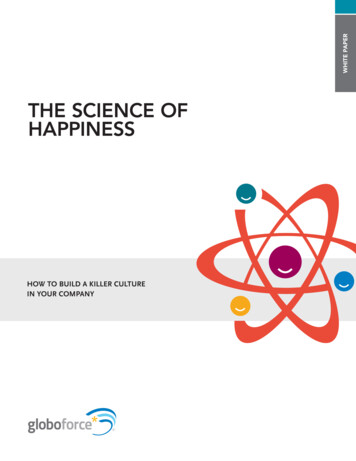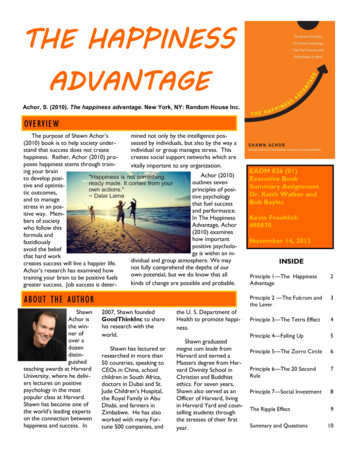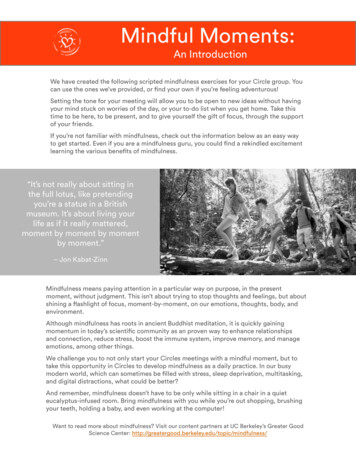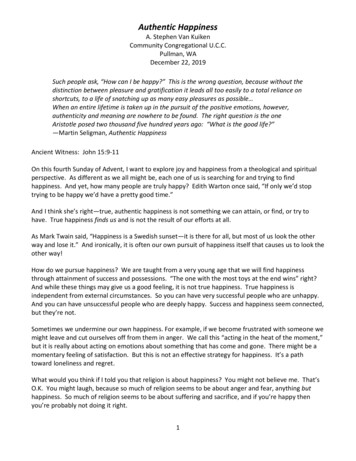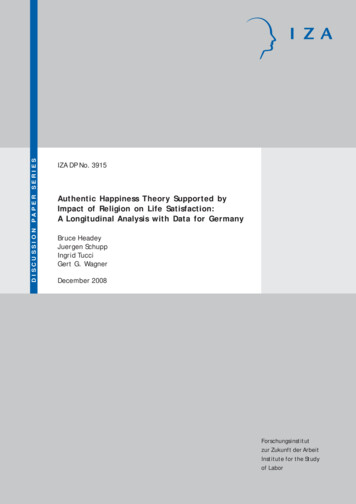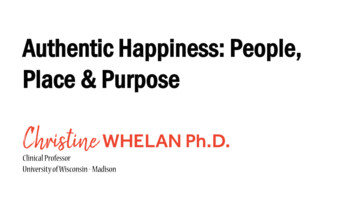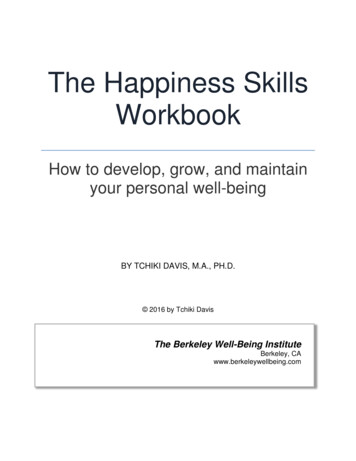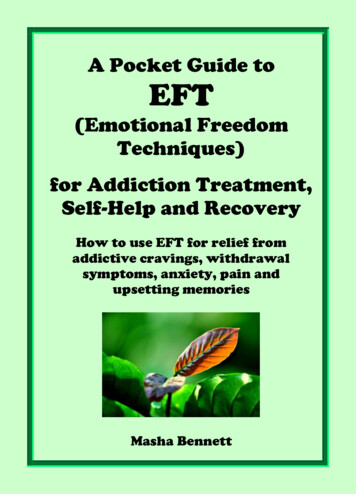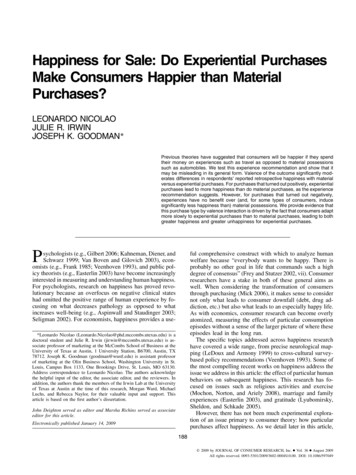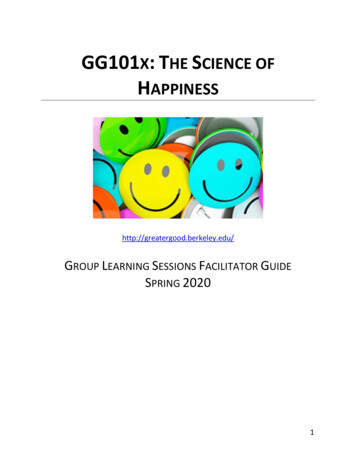
Transcription
GG101X: THE SCIENCE OFHAPPINESShttp://greatergood.berkeley.edu/GROUP LEARNING SESSIONS FACILITATOR GUIDESPRING 20201
PrologueThis Facilitator Guide is a resource for individuals leading group learning sessionsto complement the online course GG101x: The Science of Happiness, produced byUniversity of California, Berkeley’s Greater Good Science Center and hosted onthe edX.org platform.The aim is for students to complete the online portion of the courseindependently, then meet once a week with fellow students to review materialand engage in course-related activities—all guided by the self-appointedfacilitator. This guide suggests a chronological framework for each session, listingspecific topics to discuss and activities to try. Facilitators may deviate from thisschedule as desired—for instance, by holding half as many group meetings thatcover twice as much material, or omitting suggested segments that are not wellsuited to their particular group.In principle, anyone is free to take on the role of facilitator and use this guide tosupport a group of people who want to come together to have a deeper learningexperience of the Science of Happiness. People may even share the role anddelegate facilitator duties for each week.For those interested in facilitating a Science of Happiness group withinprofessional setting, consider earning a Verified Certificate of Achievement inGG101x: The Science of Happiness on edX.org beforehand, and obtaining someexperience leading workshops or facilitating group-based experiences.This Facilitator Guide was last updated:December 6, 20192
ContentsGG101x: The Science of HappinessPrologueContentsContributorsHow to Use This GuideInfo Session – Course OverviewWeek 1 – Introduction to the Science of HappinessWeek 2 – The Power of Social ConnectionWeek 3 – Compassion & KindnessWeek 4 – Cooperation & ReconciliationWeek 6 - MindfulnessWeek 7 – Mental Habits of HappinessWeek 8 - GratitudeWeek 9 – New Frontiers and Happiness “Fit”Appendix A – Mindfulness ScriptsAppendix B – Terms of Happiness1234713202327303538424651553
ContributorsLead AuthorJanelle Painter, Ph.D., is a psychologist at the VeteransAffairs Puget Sound Health Care System, Seattle. Shereceived her doctorate in Clinical Psychology from theUniversity of California, Berkeley. During this time, shecontributed to the mission of the GGSC by serving as aHornaday Graduate Fellow. Janelle is committed todeveloping and implementing empirically supportedinterventions that promote positive emotions andwellness. She is actively involved in research examiningservice utilization among Veterans with chronic andcomplex mental health concerns with the goal of identifying barriers to treatmentand improving access to care. When she is not working with Veterans, Janelleenjoys exploring the Pacific Northwest.Course Co-InstructorsDacher Keltner, Ph.D., is a professor of psychology at the University of California,Berkeley, and the founding faculty director of the GGSC. Since earning hisdoctorate from Stanford University, Dacher has devoted his career to studying thenature of human goodness and happiness, conducting ground-breaking researchon compassion, awe, laughter, and love. Dacher is the author of the best-sellingbooks The Power Paradox: How We Gain and Lose Influence, and Born to Be Good(W.W. Norton, 2016 & 2009) and a co-editor of the anthology The CompassionateInstinct (W.W. Norton, 2010), in addition to more than 100 scientific papers andtwo best-selling textbooks. An outstanding speaker who has earned manyresearch and teaching awards, Dacher has received rave reviews for his “HumanHappiness” course at UC Berkeley, which was formative to GG101x: The Scienceof Happiness. His work is featured regularly in major media outlets, including TheNew York Times, CNN, and NPR. In 2008, the Utne Reader named him as one of 50visionaries who are changing our world.Emiliana Simon-Thomas, Ph.D., is the Science Director at the GGSC at UCBerkeley. She earned her doctorate in Cognition, Brain and Behavior Psychologyat Berkeley, examining how emotions influence thinking. Emiliana runs scientific4
initiatives at the GGSC like the Expanding Gratitude project and the ResearchFellowship program, and also co-instructs GG101x: The Science of Happiness. Hercurrent work examines the biological underpinnings and overall advantages ofbeing a more prosocial person. Looking at how connecting with others, beingkind, and cooperative benefits health, well-being, social life and work, Emiliana’swork aims to fully explore the potential for—as well as the benefits of—living amore meaningful life.Course ProducerJason Marsh, M.J., is the Greater Good Science Center’s director of programs andthe founding editor-in-chief of the GGSC’s award-winning online magazine,Greater Good. A graduate of Brown University and the UC Berkeley GraduateSchool of Journalism, Jason is also a co-editor of two anthologies of Greater Goodarticles: The Compassionate Instinct (WW Norton, 2010) and Are We Born Racist?(Beacon Press, 2010). What makes Jason happy is chasing fly balls, playingcharades with his daughter, and reading A.O. Scott.GG101x Instructional Team ContributorsHai Hoang, B.A., graduated from the University of California, Berkeley, withhighest honors in psychology. He has been a course assistant for the Science ofHappiness since the course’s first launch in 2014, and his primary role is buildingthe course contents on edX. Beside supporting GGSC’s works, Hai is a data analystfellow for the Carnegie Foundation, Stanford. In his free time, Hai enjoys doingmartial arts and photography, but what makes him most happy is being with thepeople he loves.Kira Newman, B.A., is an editor and web producer at the Greater Good ScienceCenter, and a former course assistant for the Science of Happiness. Offline, she isthe creator of CaféHappy, a Toronto-based meetup that gathers monthly todiscuss how to be happier. Kira comes to GGSC from the world of tech journalism,where she was published in outlets including Social Media Monthly and Tech.co.She spent four years traveling around the world and loves speaking French, swingdancing, and exploring local cafés.Juliana Breines, Ph.D., is an assistant professor of social psychology at theUniversity of Rhode Island. She received her Ph.D. in Social-Personality Psychologyfrom the University of California, Berkeley, and her B.A. from the University ofMichigan. Her research examines how social experiences shape the way people5
treat themselves, and how positive and negative forms of self-treatment (e.g.,self-compassion, self-criticism) impact health and well-being.Yves Van Melckebeke, M.B.E., consults organizations in optimizing businessstrategy, innovating and managing major transformation projects. He specializedboth in change management and in incorporating principles of positivepsychology into the workplace culture and provided services. He is also a formerassistant and community leader for the Science of Happiness online course. Whatmakes him happy is spending time with his family and friends, helping people todevelop their full potential, as well as contributing to the evolution of a morepositive society.6
How to Use This GuideThis Facilitator Guide provides a framework for presenting material, discussingtopics, and guiding practical exercises from GG101x: The Science of Happinesswithin a group setting. Selected material from each week of the online course ispresented within a roughly two-hour, weekly group session. Each session isdivided into multiple sections which are described in detail below. This guide isnot intended to be a verbatim script. Rather, people in the facilitator role arewelcome to tailor or modify the presentation of material to match their personalstyle and the interests and needs of the group.Schedule Online course: GG101x: The Science of Happiness on edX.org is offered as a10-week course, in either a synchronous/instructor-led format or in a selfpaced format. The synchronous/instructor-led course is delivered one week ata time beginning the first Tuesday in September, and students are expected toprogress through the course over a ten-week span, together. The self-pacedcourse launches the first Tuesday in January; all course materials are offered atonce and students can complete the course at their convenience any timebefore the course close date—usually the end of June. The first thing to do isdecide whether you want to facilitate group sessions in conjunction with a fall,synchronous or a spring, self-paced version of the online course, GG101x: TheScience of Happiness. Audit or Verified? People can enroll in GG101x: The Science of Happinesseither free as an Audit learner, or pay the fee to enroll as a Verified learner.Verified learners go through a brief process of providing official ID to verifytheir identity to ensure that they are the individuals associated with theironline edX.org account. Access to the course is different for Audit and Verifiedlearners. First, Audit learners do not see sections of the course that allowlearners to earn credit (e.g. Problem Sets or Exams) and second, Audit learnershave access to the course for a limited time period (10 weeks from the datethey enroll.) Verified learners see all sections of the course, have anindividualized Progress page that tracks credit earned within the course, andhave access to the course for the entire time that the course is open, as well asafter it closes (in archived format, which means learners can no longer earncredit towards a Verified Certificate, but can see all course materials.) If youare leading a group through GG101x: The Science of Happiness, a first step is7
to decide if you and your group will participate in the course as Audit orVerified learners. Choosing Audit, you will have exactly 10 weeks from the dateof registration to get through the course, and you will not see any creditearning items in the course. Choosing Verified, you and group members willneed to pay the Verified enrollment fee and submit ID to edX.org, and will seeeverything in the course, be able to track your progress on credit-earningsections of the course, and have a flexible time window for completing thecourse. Group Meetings: Once you select the GG101x: The Science of Happinesscourse and enrollment track (Audit or Verified) that you intend to link yourgroup sessions to, you should begin to reach out to potential group members.Ideally, this outreach begins 4-6 weeks prior to the date that you intend tohold your “Introductory Session” (page 9.) Your Introductory Session shouldoccur within 1-3 days of the course open date for the synchronous course andno later than 10 weeks from the course close date for the self-paced course.8
Sample schedule for Group Sessions for a GG101x Spring, Self-Paced CourseSessionDateStatusIntro SessionMonday Feb 3Before people have begun the onlinecourseWeek 1 SessionMonday Feb 10People have enrolled/completedWeek 1 of courseWeek 2 SessionMonday Feb 17People have completed Week 2 ofcourseWeek 3 SessionMonday Feb 24People have completed Week 3 ofcourseWeek 4 SessionMonday March 2People have completed Week 4 ofcourseWeek 5 SessionOPTIONAL Monday Review/discuss Midterm ExamMarch 9(Verified only)Week 6 SessionMonday March 16People have completed Week 6 ofcourseWeek 7 SessionMonday March 23People have completed Week 7 ofcourseWeek 8 SessionMonday March 30People have completed Week 8 ofcourseWeek 9 SessionMonday April 6People have completed Week 9 ofcourse and are ready to discuss theFinal Exam9
Weekly Session Sections Session Overview: This section provides a summary introduction of the keytopics for each week. Facilitators can either read these bullet points to thegroup or paraphrase based on their own understanding of the content area. Check-In: This section provides an opportunity for people in the group to getto know each other, and for the facilitator to learn about people’s generalreactions to the course. This section is not meant to elicit lengthy or detailedgroup discussions. If conversations do begin to deepen, facilitators should notethe theme, remind the group that time is deliberately delegated for deeperdiscussions later in the session, encourage speakers to sum up their thoughtsquickly, and move on. Happiness Content: This section provides a more in-depth review of thematerial presented within each week of GG101x: The Science of Happinessusing multiple formats including key points, videos, and discussion prompts.The goal of this section is twofold: (1) confirm that people in the group have astrong grasp of the course material; and (2) allow time for thorough discussionof course topics. Again, facilitators may choose to read through the key pointsand discussion prompts as written, or they can reorganize and modify asappropriate to match the interests of the group. Happiness Practice: This section provides guidance for facilitators to supportthe group in trying happiness practices together and, again, includes keypoints, descriptions, instructions or scripts, and discussion prompts. The goalof this section is threefold: (1) review the scientific rationale and benefits ofeach happiness practice; (2) actively engage in the happiness practice and/orreflect upon experiences with happiness practices over the past week; and (3)discuss experiences, reactions, and responses to engaging in the happinesspractices. Unlike in other sections, facilitators should closely followinstructions or scripts when guiding the happiness practices. General Group Reflections: This section provides an opportunity for groupreflection and additional discussion. Facilitators may choose to read theprovided discussion prompts, use this time to revisit topics brought up duringthe check-in, or continue discussions of other topics that came up during thesession. Preparing for Next Week: At the end of each session, facilitators are asked toorient people in the group to the coming week. This section includes a video10
link from GG101x: The Science of Happiness that introduces the upcomingweek’s material. Though not mandatory, viewing course videos togetheracquaints the group with the kind of learning they will be doing outside of thegroup sessions. This section also includes a quiz related to the next week’smaterial. People can complete the quiz electronically during the session (ifthey have Internet access), and discuss their results and feedback.Logistical Considerations Handouts: Facilitators may elect to download, print, and photocopy the coursesyllabus and provide it as a handout during the first meeting. Use of Electronic Resources: This guide includes several suggestions formultimedia presentation during group meetings. It is recommended thatfacilitators arrange to use a meeting space that has Internet access in order tocollectively view online course material. Facilitators should have all of thesuggested videos for each week’s meeting cued up on their playing device(e.g., computer, phone) before the group assembles. Live links can be found inthe PDF version of this guide. Projection: People will enjoy watching videos together more if there is a large,single display projected from a computer. Facilitators should arrange to have aprojector to project video from their playing device, and a plain wall or screento project upon and speakers to amplify audio. Annotation: A wall-mounted chalkboard or large paper on a sturdy easel isvery useful for noting key ideas or providing instructions to the group duringsessions. Facilitators should try to arrange to have a large surface to write onduring meetings. Between-Session Communication: Facilitators are encouraged tocommunicate with group members between sessions via email or social media(e.g., coordinating logistics, sharing additional resources, or sending discussionprompts) and by creating an online Happiness Team within GG101x: TheScience of Happiness on the edX platform (see “Happiness Teams FAQ” and“Teams” tabs on the course landing page), and regularly posting within theirteam’s discussion threads. These added social interactions will add to the funand help to enhance course learning! Midterm and Final Exam Weeks: Online, GG101x includes two designatedweeks for exams: the Midterm (Week 5) and the Final Exam (Week 10).Facilitators will not have new material to present or review during exam11
weeks. However, if the group would like to meet during these weeks to reviewcourse material and/or continue discussions, facilitators are encouraged toschedule a meeting.12
Info Session – Course OverviewSESSION OVERVIEW (5 MINUTES)Welcome to The Science of Happiness, [Location or Organization or group name].My name is [Your Name]. I am [Where are you from? What do you do outside ofthis? What’s something funny about you?]. I am here to guide, organize andsupport our Science of Happiness [Location or Organization or group name]gatherings over the next ten weeks. I’ll be here to meet with you all each week toreview, reflect upon, and discuss material from the online Science of Happinesscourse, and to guide us through exercises and activities that have been shown tostrengthen happiness.The goals of today’s introductory session are to go over the logistics of the onlinecourse, find consensus around the parameters of our group meetings, and get toknow each other as we embark upon studying the Science of Happiness togetherover the next ten weeks.INTRODUCTION VIDEO (5 MINUTES)Before we get started, I’d like to share The Science of Happiness Course Video[2:14].GROUP INTRODUCTIONS (30 MINUTES)As you’ll soon learn, feeling connected, or like you belong socially is key tohappiness, which is why we believe it’s important to study the Science ofHappiness together. Getting to know each other, forming our own culture oflearning around the Science of Happiness, is just one aspect of feeling open andconnected with others.Let’s begin with some introductions. Please go around the room and share [writeprompts on a board].1. One good thing that happened over the course of the week2. What drew you, and what are you hoping to gain from this course?3. If you were a superhero/animal/piece of furniture/[other], which would you beand why?ONLINE COURSE INSTRUCTORS (5 MINUTES)In addition to our meetings in person, you will all be guided through the onlineScience of Happiness course by two of the leading experts in the field, Dacher13
Keltner and Emiliana Simon-Thomas from University of California Berkeley’sGreater Good Science Center. I’ll let them introduce themselves.Week 1: Introduction to the Science of Happiness Welcome to the Course! Welcome from Dacher & Emiliana [4:16].COURSE OVERVIEW: COURSE SYLLABUS (15 MINUTES)GG101x: The Science of Happiness is the first Massive Open Online Course(MOOC) to teach the groundbreaking research exploring the roots of a happy,connected, and meaningful life. Some call this field “positive psychology,” but itmight be better described as “pro-social” psychology. Over 450,000 people frommore than 200 countries around the world have registered for GG101x. Ninetyeight percent of those who complete it say they would recommend it to others.[Pass out course syllabus and review details with group. Make sure to discuss thekey points included below.] Course Components: The online course includes a variety of instructionalcomponents, including video lectures, readings, problem set questions, anddiscussion forums. There are eight weeks of material dedicated to key themesthat pertain to happiness, and two weeks that offer time to review materialsand complete the Midterm and Final exams. The material for each weektypically takes three to five hours to complete in full, depending on eachperson’s prior experience and expertise. Weekly Happiness Practices: Happiness Practices are research-tested activitiesthat have been shown to boost happiness and well-being. In addition tocovering the instructional content, you will be invited to try happinesspractices throughout the course. You will be encouraged to do some practicesmultiple times; others are suggested at a less frequent pace. Ungraded Components: The course also offers several ungraded opportunitiesto help integrate the Science of Happiness into daily life. You are encouragedto interact with classmates from all over the world via the discussion forms, toreflect on how you have been feeling lately through weekly Check Ins, to tryHappiness Practices and gage their impact, effectiveness and fit, and finally, toshare your perspective on the Pre- and Post-Course surveys. Graded Components: If you’re interested in earning a Verified Certificate ofAchievement from the edX platform, you will need to pay the listed fee on edXand complete the graded components of the online course, including weeklyProblem Sets (30% of grade), the Midterm (30% of grade), and the Final exam14
(40% of grade). To pass the course, you will need to earn a total grade of atleast 60%. Learners enrolled on the Audit track do not have access to gradedcomponents of the course. Continuing Education: If you would like to earn continuing education credithours for completing this course, you will need to register with our CEadministering partner, R. Cassidy Seminars, and pay the associated fee. Happiness Teams: Within GG101x on the edX platform, people can selforganize into teams—i.e., groups that have designated discussion threadsonline and work together much like we are doing here and now. I have set up aHappiness Team for us in GG101x on edX already, called [Name of Team] –please join [Name of Team] next time you are logged into edX so we canconnect and discuss things while we are doing the course online, too. Overview of the Main Themes Covered in the Course: Now, let’s watchDacher walk us through the topics that will be covered in the online course.o Week 1: Introduction to the Science of Happiness Welcome to theCourse! Course Roadmap [6:43]. Are there any questions about the structure, parameters, or logistics of theonline course?NAVIGATING THE ONLINE COURSE (15 MINUTES)[Walk students through the components and features of the edX course website.]To learn more about how to use edX.org, select the How to Navigate This Course The Science of Happiness on edX section at the beginning of the course – it willbe worth your while!As we progress through the weeks, the material within each week is organizedunder different headings and subheadings, which can be seen by scrolling up ordown and clicking on any subheading on the Course tab page.From the Course tab page, you can click on any one of the subheadings to see allof the material organized therein, then progress through the material by clickingon any one of the units within the horizontal progress bar across the top of thescreen, or by pressing the “ Previous” or “Next ” buttons that anchor the leftand right ends of the horizontal progress bar.15
Course: The Course tab takes you to a page with all course material links,course updates, important dates, as well as downloadable PDFs of the coursesyllabus and bibliography on the right side of the screen. For “synchronous”offerings of the Science of Happiness in the fall, the material for each week ismade available on sequential Tuesday mornings. For “self-paced” offerings inthe spring, the material for the entire course is available for the duration ofthe course term. Discussion: The Discussion tab allows you to post questions, ideas orresponses to course content, and respond to fellow students’ posts. Discussionforums provide another option to connect with classmates, albeit virtually, asyou explore the Science of Happiness. Progress: The Progress tab shows you to see your own scores for creditearning course learning components from each week of the course (accessibleto Verified Learners only). Please note that edX counts any problem sets orexams that you haven’t done as a “0,” so your total grade will be low in thebeginning of the course. Happiness Teams: Once again, I have set up a Happiness Team for us inGG101x on edX called [Name of Team] – please join [Name of Team] next timeyou are logged into edX so we can connect and discuss things while we aredoing the course online.Any questions about how to use the course website?16
OUR HAPPINESS GROUP COMMUNITY (15 MINUTES)Our in-person meetings are meant to complement your experience with theonline course by providing opportunities to discuss course materials, tryhappiness practices, and interact with other students in person. Our meetings arenot designed to serve as a personal support or therapy group, but rather as a timeto deepen your understanding about the ideas within and share your reactions tothe course. If you are seeking a mental health support or therapy group, pleasecontact your health care provider for recommendations.To get the most out of our meetings together, we will all expect each other tocomplete the online portion of each week of the course prior to meeting. Forexample, for next week’s meeting, which will be held every [day of the week] at[time] in [location], we should all have completed Week 1: Introduction to theScience of Happiness. You are welcome to partner up and go through the onlinecourse together if you prefer. Attendance: If you are unable to join a meeting, please let me know bycontacting [number to call or text, email, other preferred contact] at least twohours before meeting time. To get the most out of this experience, it’s idealfor as many of us as possible to attend each meeting – each person’s ideas,thoughts, and feelings about this material are very valuable to the learningexperience and overall impact of the course. If you miss more than three ofour meetings, I encourage you to join another group at another time so thatyou can get the most out of your experience. Finally, if your plans change oryou foresee the need to discontinue attending group sessions, please let meknow right away so that I can plan accordingly. Confidentiality: Our meetings together will involve sharing personal thoughts,feelings, and experiences. Please be sure to respect the group by notdiscussing the personal details of what is shared within this group with peopleoutside of this group. Mutual Respect: In order to truly benefit from each other, it will be importantto create an open, supportive, respectful, and nonjudgmental environment,where people feel safe and welcome to voice their feelings and share the floorwith others. Please do not interrupt, monopolize discussions, or speak in ahostile way in this group.Anything you would like to add to our discussion of group expectations? Can weall agree to uphold these expectations?17
HAPPINESS PRACTICE (20 MINUTES)Before we wrap up today’s session, let’s try a Happiness Practice called“Capitalization,” which is not actually in the online course (perk of our groupsessions!) – and has been shown to boost feelings of empathy and connection.The capitalization practice involves having a quick conversation with someoneelse in this room, but in a special way. Break off into pairs and decide which oneof you will share about a good thing that happened today (we will switch rolesafter five minutes). As your partner shares, try engaging in the followingsbehaviors [write prompts on a board]: Make good eye contact, showing that you are interested in and engaged inwhat they have to say. Express positive emotion by smiling, nodding, or even cheering (ifappropriate!). Make enthusiastic comments—e.g., “That sounds great,” “You must be soexcited,” or “Your hard work is definitely paying off.” Ask constructive questions to find out more about the positive aspects of theevent. For example, if the person tells you about receiving recognition at workfor a project, you could ask for more details about the project, what aspects ofthe project he or she feels especially proud of, and how it felt to receiverecognition for it. Comment on the positive implications and potential benefits of the event. Forexample, “I bet this means you have a better chance of getting a promotionthis year.”[Ask the dyads to switch roles after five minutes.] Discussion: What was that experience like for you? What emotions did youexperience? Did you feel more or less connected to your partner?PREPARING FOR NEXT WEEK (10 MINUTES)Next week’s theme, the first week of the course, is: Introduction to the Science ofHappiness. In the online course, you will explore prevailing scientific and culturalviews of happiness, explore how happiness is defined and measured, and learnabout the benefits of living a happier life.Here’s a sneak peak of what to expect during next week’s course:18
Week 1: Introduction to the Science of Happiness Why Does HappinessMatter? Why We Need the Science of Happiness Today [4:25].19
Week 1 – Introduction to the Science of HappinessSESSION OVERVIEW (5 MINUTES)The goal of Week 1 was to introduce you to The Science of Happiness. Wereviewed historical, philosophical, and cultural views of happiness, explored howscientists define and measure happiness, and learned about the benefits of livinga happier life.CHECK-IN (15 MINUTES)Welcome back! Thanks for joining us.Since we’re still getting to know each other, let’s please go around the room andshare our names again, and add one thing you found interesting, surprising, orconfusing about the online course thus far.I’ll write these on the board, and if we don’t already cover these topics duringtoday’s session, we’ll have time to discuss your thoughts at the end of ourmeeting. [If people begin discussing these topics during the check-in, remind themthat this is a brief check-in and they will have time to discuss the course contentlater in this session.]HAPPINESS CONTENT: WHAT IS HAPPINESS? (30 MINUTES)Key PointsSonja Lyubomirsky defines happiness as “the experience of joy, contentment, orpositive well-being, combined wit
Dec 06, 2019 · on compassion, awe, laughter, and love. Dacher is the author of the best-selling books The Power Paradox: How We Gain and Lose Influence, and Born to Be Good (W.W. Norton, 2016 & 2009) and a co-editor of the anthology The Compassionate Instinct (W.W. Norton, 2010), in addition to more than 100 scientifi
